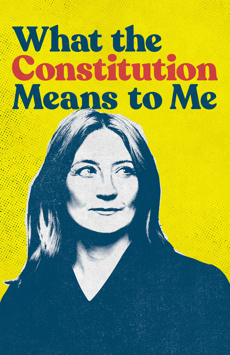

Is the Constitution enough of a temptation to draw you to the Helen Hayes Theater for playwright Heidi Schreck's What the Constitution Means to Me? It should be. Part bio, part poli-sci, this is an original free-wheeling, emotional, and audaciously relevant play, at a time the country can benefit from its dose of provocative honesty. Teenage Heidi Schreck, from Wenatchee, Washington, an “abortion-free zone,” was persuaded by her mother to enter her speech about the Constitution in the American Legion Oratory Contest. If she wins, she will earn enough money for college. She did win the contest and college was paid for. This play, 30 years later, is how Schreck recalls that time and what she has discovered about the Constitution and women. When the idea first came to her about writing a play, she tried to think back to her 15-year-old self who had really loved this document. "Because I did, I loved it. I was a zealot!" She asked her mother for the speech but, unfortunately, Mom had thrown it out, so Heidi recreated the experience. Back to 1989. The setting is an American Legion Hall designed by Rachel Hauck, a wood-paneled stage with a photo wall of (presumably) upright white men. A secondary character, Mike Iverson, runs down from the back of the theater to take his place as a no-nonsense, stick-to-the-rules Legion debate moderator. Teenage Schreck strides onto stage, sensibly dressed by Michael Krass in yellow blazer, white shirt and jeans, smiling broadly and enunciating well. Occasionally, to indicate the past and present, she removes her jacket when speaking as an adult and returning to teenage mode, she slips back into the blazer. Director Oliver Butler keeps a casual, energetic delivery. Schreck breezes ahead bringing out a bright, naive, imaginative girl who evolves into a woman of admirable perception of the Constitution, fascinated by its facets and contradictions. Debating before the all-male Legion audience, she would occasionally break her trend of thought and enthusiastically reveal some outburst of sex and violence, indicative of inner adolescent fantasies. "The Constitution can be thought of as a boiling pot in which we are thrown together in sizzling and steamy conflict to find out what it is we truly believe." One thing she discovered was that "the document will not protect us from the violence of men.” Searching back through her family history, Schreck learned that her German great-great grandmother was mail-ordered from a catalogue by her husband and when she died in a mental institution at age 36, the cause was "melancholia". Her own grandmother was severely abused by her husband and Schreck points out, “more American women have been killed by violent male partners in the last century than Americans have been killed in wars, including 9/11.” Founding mothers (like Abigail Adams and Mercy Otis Warren) demanded the document acknowledge their humanity but men had the law on their side. They virtually owned their wives and were legally allowed to beat them. In 1871, a court ruled in Fulgam vs. the State of Alabama, that it would finally be unlawful for a man to beat his wife with a stick, pull her hair, choke her, spit in her face or kick her. In 1910, the U.S. Supreme Court ruled that a wife still could not legally charge her husband for assault and battery. It was not until 1848 that the Married Woman’s Property Act was passed in New York, freeing a woman from liability for her husband’s debts, allowing her to write contracts, lawsuits and receive inheritances in her own name. This did not become nationwide until 1900. Voting rights was another battle, won in 1920 but a constitutional amendment for Equal Rights, including women's choice over their own bodies, has still not passed. As the play draws to an end, Iverson moves to the present and, moderating another debate, he pairs Schreck with a bright young teen (Rosdely Ciprian, in this performance. Thursday Williams takes alternate performances). They would argue whether to abolish or keep the Constitution as it is today. An audience viewer was asked to choose the winner. With a spirit of spontaneity and, yes, optimism, Schreck's play ties the founding document with today's political events. Iverson's admission that he is a gay man points to another facet to the role of the Constitution, that has allowed the government to view people of color and different cultures as the “other." This is a spot-on informative conversation, delivered with gregarious humor and heart, plenty of laughs and also some tears, with Schreck's uplifting final message, "The only thing holding us together right now as a country is a collective faith in this document.”
